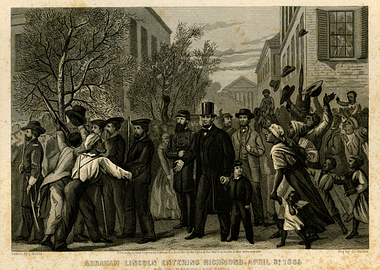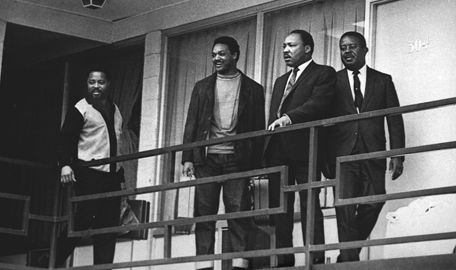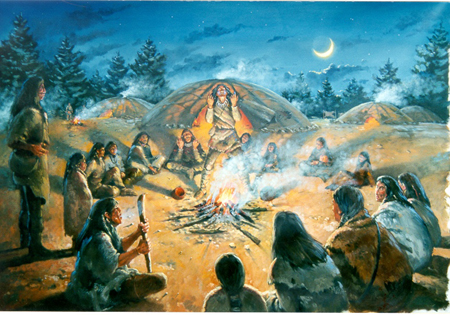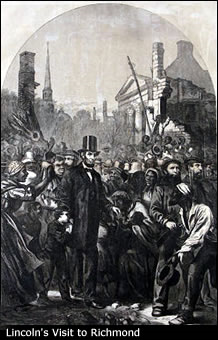 Today was a pretty momentous day in history. What do you know about what happened on April 4 in past times? If you are like most Americans, the answer is probably not much. Which is sad. I know that many Americans think history is boring. We are so busy rushing headlong into the future, we find little time to think about what is past. But that is not only sad, it is tragic.
Today was a pretty momentous day in history. What do you know about what happened on April 4 in past times? If you are like most Americans, the answer is probably not much. Which is sad. I know that many Americans think history is boring. We are so busy rushing headlong into the future, we find little time to think about what is past. But that is not only sad, it is tragic.
Today in 1841 President Harrison died after only a month in office. Today in 1865, the rebel capital of Richmond, Virginia fell into the hands of United States forces, hastening the end of the Civil War. Today in 1968, the Rev. Dr. Martin Luther King was brutally and tragically assassinated in Memphis, Tennessee.
Did you know all those things?
It has often been said that those who fail to learn from the past are doomed to repeat it. And that makes sense. How can you possibly understand fully not only where you are going, but why, if you have no real understanding of where you have been?
But on another level, teaching history is really no different than telling a story, and storytelling is the single most enduring and ancient form of entertainment in human existence. From the cavemen gathered around a fire retelling of the bear hunt, to the latest forms of electronic entertainment, to the guy at the water cooler telling a joke, every human has probably engaged in storytelling at some point.
 And history is full of the most amazing stories. So, why is it that so many people find history boring? Because of how the stories are told. Any comedian can tell you it isn't the joke that is funny, but how you tell it. The same is true for storytelling. We all know people who simply cannot tell a story well to save their life. How many times have you heard some friend of yours retelling a great story that you told to them, only to have to suffer through a butchered version that left out the good points and reshuffled the order so as to destroy the drama or humor?
And history is full of the most amazing stories. So, why is it that so many people find history boring? Because of how the stories are told. Any comedian can tell you it isn't the joke that is funny, but how you tell it. The same is true for storytelling. We all know people who simply cannot tell a story well to save their life. How many times have you heard some friend of yours retelling a great story that you told to them, only to have to suffer through a butchered version that left out the good points and reshuffled the order so as to destroy the drama or humor?
There is an art to story telling and, by extension, there is an art to teaching history.
Let's take a look at one of the events mentioned above, the fall of Richmond.
Okay … the rebels fled Richmond and the war was almost over. Cool. Everyone knows the rest of this story. A few days later Abraham Lincoln was assassinated. Most people would leave it at that. No wonder most people think history is boring. Try this version instead:
After four long years of war that had taken a heavy toll on the nation and on it's president, and after a particularly grueling and bloody endgame lasting months in which US forces laid siege to the beleaguered rebel capital, the end was drawing near. President Lincoln, a gaunt, hollowed out memory of the strapping man who had entered Washington four years earlier, was eager to see the end. He had come to the headquarters of General Grant some two weeks earlier, and sensing that the end was indeed finally ear he had remained, in the company of his youngest son, Tad. On April 3 the city of Richmond finally fell. What was left of the rebel forces fled, along with almost the entire population of white southerners living there. The following day, on April 4, a vessel carrying the president, his son and a few sailors, made it's way up the river toward the city. It landed and the president, impatiently unwilling to await soldiers to guard him, stepped ashore, accompanied only by his son and a handful of sailors. Without fanfare, he began to walk through the newly deserted city. But soon, some newly freed African American women recognized him. They ran to him and bowed but the thin president told them “... to kneel only to God and thank him for the freedom you will hereafter enjoy.”
He then walked on through the empty streets, but in his wake a crowd of African Americans began to grow and follow him. He saw the Libby Prison, where so many captured American troops had languished and suffered. He walked to the residence of the rebel leader, Jefferson Davis. And he walked to the Virginia Statehouse where he visited the chambers of the rebel congress. All the while, his son Tad strolling next to his father holding his hand.
As he left the statehouse he found himself now faced with an enormous throng of awestruck African Americans, newly released from bondage by masters that had fled suddenly the day before. Now, into their midst came the very leader of the country, the very man many held singly responsible for their new liberty. Not surrounded by a massive and terrifying army, but essentially alone but for the small boy holding his father's hand. For a moment, the tall man and the silent crowd regarded each other. What went through the minds of those present that day? What thoughts passed through the minds of those in that crowd. What passed through the mind of the man himself?
A few days later, President Lincoln went to the the theatre, and the world was never the same again.
Now, was that boring?
Try hearing that story told by President Lincoln himself, in front of a crowd of young students. You can hear a pin drop at such a moment. And they will never forget that story.
That is the power of good storytelling.
That is the power, educationally, of good school assembly programs. Whether it is Abraham Lincoln, or Martin Luther King, Frederick Douglass, Thomas Edison or the delightful Benjamin Franklin, a good story teller can make history as exciting as the latest Hollywood action flick.
So, when can we come and help your kids discover the excitement of history?
Geoff Beauchamp is the Regional Manager of Mobile Ed Productions where "Education Through Entertainment" has been the guiding principal since 1979. Mobile Ed Productions produces and markets quality educational school assembly programs in the fields of science, history, writing, astronomy, natural science, mathematics, character issues and a variety of other curriculum based areas. In addition, Mr. Beauchamp is a professional actor with 30 years of experience in film, television and on stage. He created and still performs occasionally in Mobile Ed's THE LIVING LINCOLN. He also spent ten years coordinating assembly programs for the elementary school where his own children went to school.






